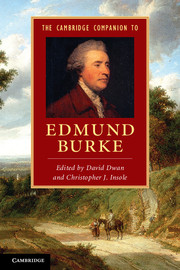Book contents
- Frontmatter
- Contents
- Contributors
- Acknowledgements
- Method of Citation
- Chronology
- Introduction Philosophy in Action
- 1 Burke’s Life
- 2 Burke, Enlightenment and Romanticism
- 3 Burke as Rhetorician and Orator
- 4 Burke’s Aesthetic Psychology
- 5 Burke on Law and Legal Theory
- 6 Burke on Political Economy
- 7 Burke and Religion
- 8 Burke and the Constitution
- 9 Burke and the Natural Law
- 10 Burke and Utility
- 11 Burke and the Ends of Empire
- 12 Burke and the American Crisis
- 13 Burke on India
- 14 Burke and Ireland
- 15 Reflections on the Revolution in France
- 16 Burke’s Counter-Revolutionary Writings
- 17 Burke in the United States
- Further Reading
- Index
- References
12 - Burke and the American Crisis
Published online by Cambridge University Press: 05 December 2012
- Frontmatter
- Contents
- Contributors
- Acknowledgements
- Method of Citation
- Chronology
- Introduction Philosophy in Action
- 1 Burke’s Life
- 2 Burke, Enlightenment and Romanticism
- 3 Burke as Rhetorician and Orator
- 4 Burke’s Aesthetic Psychology
- 5 Burke on Law and Legal Theory
- 6 Burke on Political Economy
- 7 Burke and Religion
- 8 Burke and the Constitution
- 9 Burke and the Natural Law
- 10 Burke and Utility
- 11 Burke and the Ends of Empire
- 12 Burke and the American Crisis
- 13 Burke on India
- 14 Burke and Ireland
- 15 Reflections on the Revolution in France
- 16 Burke’s Counter-Revolutionary Writings
- 17 Burke in the United States
- Further Reading
- Index
- References
Summary
During the American crisis of 1763–83, Edmund Burke was recognised, on both sides of the Atlantic, as ‘a friend of America’, primarily because of his determined efforts to seek a reconciliation between Britain and the American colonies on the question of taxation and his bitter criticisms of the efforts made by Lord North’s ministry to subdue the American rebellion by oppressive legislation and military aggression. Modern scholars, however, are divided over Burke’s response to the American crisis. Some maintain that Burke was well informed about American affairs, made vigorous and practical efforts to conciliate the American colonies, and played a leading role in attacking the war that Lord North’s ministry waged against the American rebels. Other scholars have argued that Burke never really fully appreciated the American position, wrongly believed that the root cause of the dispute was taxation, and used the war primarily to advance the interests of his own party. This chapter will explore the evidence that can be used to sustain these contrasting viewpoints and will suggest that he was aware of the contradictions in his position and strove to reconcile them.
Burke’s Knowledge of American Affairs
Among the many MPs who spoke or wrote on American affairs during twenty years of crisis, very few had any first-hand or deep knowledge of the situation in the American colonies. Only a tiny handful had been born in America or had spent substantial time in the colonies as merchants or landowners, civil administrators, or military officers. Burke himself never visited the American colonies, never corresponded regularly with any American Patriot during the crisis and never read widely in the American literature produced by the colonial critics of British policies. On the other hand, it is difficult to find many politicians of the period who made such an effort to educate themselves about American affairs as Burke did. Even before he entered parliament, Burke collaborated with his friend, William Burke, in producing a substantial Account of the European Settlements in America that was published in two volumes in 1757.
- Type
- Chapter
- Information
- The Cambridge Companion to Edmund Burke , pp. 156 - 167Publisher: Cambridge University PressPrint publication year: 2012

